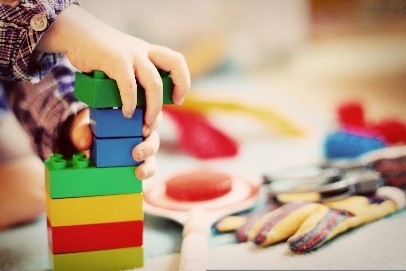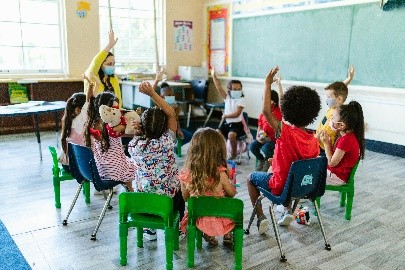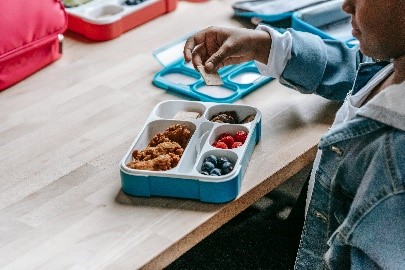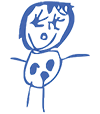EECERA Conference 2025 – Guest Blog # 11: Engagement and Interactions in Inclusive ECEC
Posted 9th August 2025
One of a series of short blog posts by presenters who will be sharing their work at the upcoming annual conference in Bratislava, Slovakia. Any views expressed in this post are those of the author(s) and do not necessarily reflect the official stance of their affiliated institution or EECERA.
Are children with disabilities truly participating? Or are we just opening the door? —Engagement and interactions in inclusive ECEC
Janina Dott – Carl von Ossietzky Universität Oldenburg



Participation in early childhood education and care (ECEC) is a fundamental right for all children and one of the United Nation’s Sustainable Development Goals (SDGs): “By 2030, ensure that all girls and boys have access to quality early childhood development, care and pre-primary education so that they are ready for primary education.” (Target 4.2; UN, 2015).

However, being ready for primary education is not just about academic skills—a sense of belonging, engagement, and building friendships are essential for children’s well-being and development. These aspects are especially critical for children with disabilities and developmental delays. True inclusion means enabling full and equal participation, not just physical presence.
Participation
It is not easy to define what participation is exactly: It is a central element of inclusion in ECEC, but its definition varies across disciplines. When speaking of participation, I refer to the International Classification of Functioning, Disability and Health (ICF) and the family of participation-related constructs (fPRC). Accordingly, it goes beyond attendance—involvement in a life-situation is what constitutes participation (Imms et al., 2017; WHO, 2001). It involves meaningful engagement and interactions with peers and adults across various settings.
Activities in daily ECEC
Children typically take part in different structured and unstructured activities in ECEC:
- Free play is a child-led activity that offers a choice of activities and materials and promotes joint activities with peers. But this freedom as well as initiating interactions can be overwhelming for some children.
- Circle time is a teacher-led, structured activity involving songs, games, or discussing routines. It provides structure, but may challenge children who struggle with being quiet or sitting still for a long period of time.
- Mealtime varies across institutions (Do all children eat their breakfast together? Or can they choose when and if they want to eat?), but still, there are certain rules children have to follow.
So, each of these activities offers both opportunities and challenges for participation.
What we know already…
Fortunately, research on inclusion in ECEC has received growing attention (Symeonidou et al., 2023). But recent studies indicate that children with disabilities participate less than their peers without disabilities. They show lower levels of engagement, especially in unstructured activities, and fewer interactions and social relationships with peers. Still, the current state of research is inconsistent and children’s engagement is influenced by many factors.
…and what we don’t know yet:
In Germany, about 48 % of children with disabilities attend inclusive ECEC. But we still lack a detailed understanding of how these children actually participate. Which activities do they engage in most? What kind of interactions do they have? Where do they face challenges or need extra support?
Our study
My PhD project takes a multi-perspective approach to analyze children’s participation. Parents and early childhood educators rated the frequency and involvement of children’s participation in different activities using a questionnaire. At the EECERA 2025 conference, I will present findings from a substudy based on direct observations. We observed 25 children with disabilities during free play, circle time, and mealtime. Using the Individual Child Engagement Record – Revised (Kishida et al., 2008), we analyzed their engagement and social interactions.
First results show a high variability of engagement between children and distinct profiles of participation in the three activities. In my presentation, I want to discuss implications and exchange further ideas how we can use these findings to improve inclusive practices in ECEC—instead of just “opening the door”.
References
Imms, C., Granlund, M., Wilson, P. H., Steenbergen, B., Rosenbaum, P. L., & Gordon, A. M. (2017). Participation, both a means and an end: a conceptual analysis of processes and outcomes in childhood disability. Developmental Medicine & Child Neurology, 59(1), 16-25. https://doi.org/10.1111/dmcn.13237
Kishida, Y., Kemp, C., & Carter, M. (2008). Revision and validation of the Individual Child Engagement Record: A practioner-friendly measure of learning opportunities for children with disabilities in early childhood settings. Journal of Intellectual & Developmental Disabilities, 33(2), 158-170. https://doi.org/10.1080/13668250802088085
Symeonidou, S., Loizou, E., & Recchia, S. (2023). The inclusion of children with disabilities in early childhood education: interdisciplinary research and dialogue. European Early Childhood Education Research Journal, 31(1), 1-7. https://doi.org/10.1080/1350293X.2022.2158632
United Nations (2015). Transforming our World: The 2030 Agenda for Sustainable Development.
World Health Organization (2001). International Classification of Functioning, Disability and Health (ICF).
About the Author
Janina Dott is a doctoral student and research associate at Carl von Ossietzky Universität Oldenburg, Germany. Her research focusses on language development, bi- and multilingualism in children with developmental disabilities, and participation in inclusive education. Find out more about her research here or connect with her on LinkedIn, ResearchGate or via e-mail.
Janina Dott will present the work referred to in this blog in Symposium Set C (Wednesday, the 27th of August). (Schedule liable to change; please refer to final programme for details).
